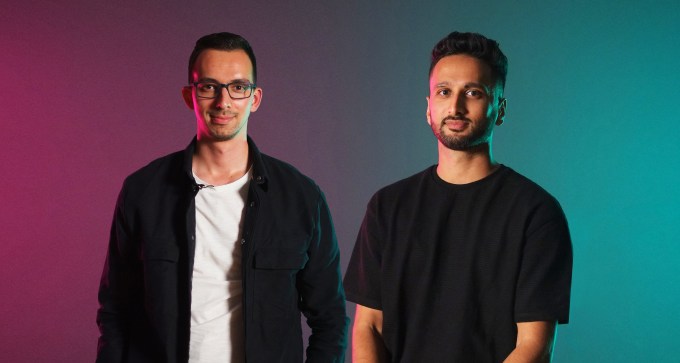Ideally, mental wellness should be considered part of a healthy daily routine, like exercise. But even exercise is difficult to turn into a regular habit. Peloton addressed physical fitness by combining smart stationary bikes with live classes and community features to create an engaging experience. Now a new startup, MindLabs, is taking a similar approach to mental wellness.
Based in London, MindLabs announced today it has raised £1.4 million (about USD $1.82 million) in pre-seed investment led by Passion Capital, with participation from SeedCamp, as well as several founders of British consumer tech startups: Alex Chesterman (Cazoo and Zoopla); Neil Hutchinson (Forward Internet Group); Steve Pankhurst (FriendsReunited); James Hind (Carwow); and Jack Tang (Urban).
MindLabs was founded earlier this year by Adnan Ebrahim and Gabor Szedlak, who previously launched and ran Car Throttle, an online media and community startup that was acquired by Dennis Publishing last year. Ebrahim told TechCrunch that MindLabs’ goal is to “make taking care of your mental health as normal as going to the gym.”
Coa wants to bring an emotional workout into your fitness regimen
Its platform will launch next year, first with a mobile app that combines live videos from mental health professionals who lead meditation and mindfulness sessions, and features to help users track their stress levels. The full platform will also include an EEG headband, called “Halo,” that measures signals, like heart and respiration rates, that can help show users how effective their sessions are.
Going from CarThrottle, sometimes described as “a BuzzFeed for cars” to mental wellness might seem like a big leap, but Ebrahim said their experience “running a media company in a tough market with a young, millennial workforce” inspired him and Szedlak to think more about the issue.

“We witnessed firsthand how there was a complete lack of investment in helping this generation with their mental health in a way that they’re used to: a community product that is mobile-first and video-led,” Ebrahim said.
“Alongside that, we had to find ways to deal with managing our own mental health, given the stresses that can come when running a fast-paced, venture-backed company. And when we saw the alarming statistics in young adult suicide rates and depression, we realized that finding a solution for our own problems would help millions of others, too.”
The two left Dennis Publishing to begin work on MindLabs at the end of January. During the next few months, including time spent in COVID-19 lockdown, they began researching and developing initial concepts for the platform.
“It’s fair to say that the pandemic did end up altering the course of MindLabs,” Ebrahim said. “For example, we built more real-time community features into the app as a result of the isolation and loneliness we are all now facing as a result of lockdown. We really want to make sufferers feel less alone during the hard times, but with the added convenience now of being able to watch our videos at home.
“This has already become the new normal when it comes to physical fitness, with companies like Peloton exploding in growth, and we see the same trend happening with mental wellness, too,” he added.
The COVID-19 pandemic has also been described as a mental health crisis, and downloads of meditation and mindfulness apps like Calm, Headspace and Relax: Master Your Destiny, have grown as people try to deal with anxiety, isolation and depression at home.
Meditation and mindfulness apps continue their surge amid pandemic
Two of the main ways MindLabs’ platform differentiates from other mental wellness apps is the combination of its video classes and EEG headband. The videos will initially range in length from 10 to 40 minutes and, like Peloton’s classes, will be available on live stream or in pre-recorded, on-demand sessions.
Instead of categorizing videos by technique (for example, meditation, breathing or visualization), MindLabs decided to sort them into issues that users want to cope with, like anxiety, relationships, motivation or addiction. For example, meditation classes may include ones focused on “Overcoming COVID-19 Anxiety” or “Coping With Stress At Work.”
Community features will be linked to the classes: The number of concurrent users in a class will be displayed, along with a live feed showing subscriber achievements, like streaks or number of minutes spent in a “calm state,” that other people can react to for positive reinforcement.
Halo was developed with a hardware specialist that Ebrahim said has seven years of building and distributing medical grade wearables.
“Most importantly our headset will be going through the rigor of ISO 13485 so we can ensure the product is of the highest quality and the data we gather is the most accurate,” he added. “We want to make this technology accessible, so we expect the price of the Halo to be comparable to, say, an Apple Watch.”
Other EEG headbands, including products from Muse and Emotiv, have been on the market for a while. In MindLabs’ case, its headband will help users visualize data before, during and after their classes, including information about their brain waves, heart rates and muscle tension, and saved in the app so they can track their progress.
Turning mental wellness into a habit
One of the biggest challenges that all mental wellness apps need to address is user engagement. It can be hard staying motivated to use a self-directed mental health app when someone is already stressed, depressed or very busy. On the other hand, when they feel better, they might stop checking in.
Ebrahim sees this as a major opportunity for MindLabs, and its EEG headband and data visualization features will play a major role. “Even though there was been a proliferation of mental health apps, retention has proven difficult. But we think that is because these apps truly don’t understand their users,” he said.
“With the data we’re able to show, not just through the Halo but through syncing with Apple HealthKit, we can show our subscribers a positive progression of their mental health, similar to how you can see your weight change on a scale, or improvement in heart-rate variability in an app. This helps build a powerful habit because we can finally help to close the loop when it comes to improving mental fitness.”
Participating in live classes provides accountability, too, he added. “The act of scheduling a class and tuning in with thousands of others is a powerful force, similar to having a personal trainer in the gym making sure you turn up and workout.”
MindLabs also plans to build communities around its instructors. During live streams, instructors will welcome new subscribers and mention user achievements. After each workout, users will get a results screen they can share, similar to screenshots from fitness apps like Strava or Nike Training Club.
In terms of protecting personal privacy, Ebrahim said MindLabs is “firmly against any form of data commercialization.” Instead, it will monetize through monthly or yearly subscriptions, and user data collected through Halo or the app will only be used to make personalized content recommendations.
In a statement about Passion Capital’s investment in MindLabs, partner Eileen Burbidge said, “We’re incredibly excited to be working with MindLabs as they transform the way we look after our minds. Mindfulness is more important now than ever and we know that Adnan and Gabor’s commitment to best in class content, quality production and unparalleled user experience means they’re the best to bring this platform to market.”































Comment